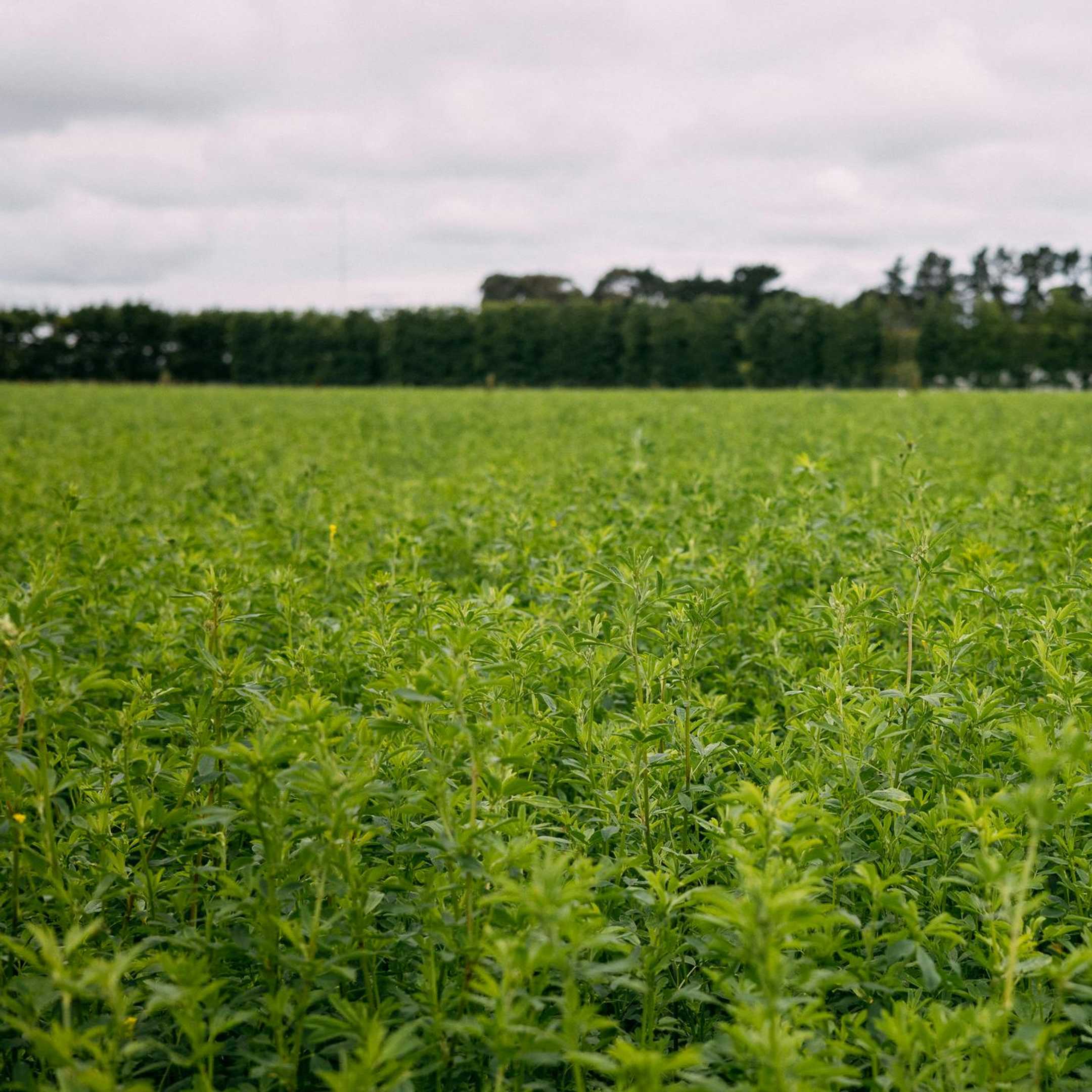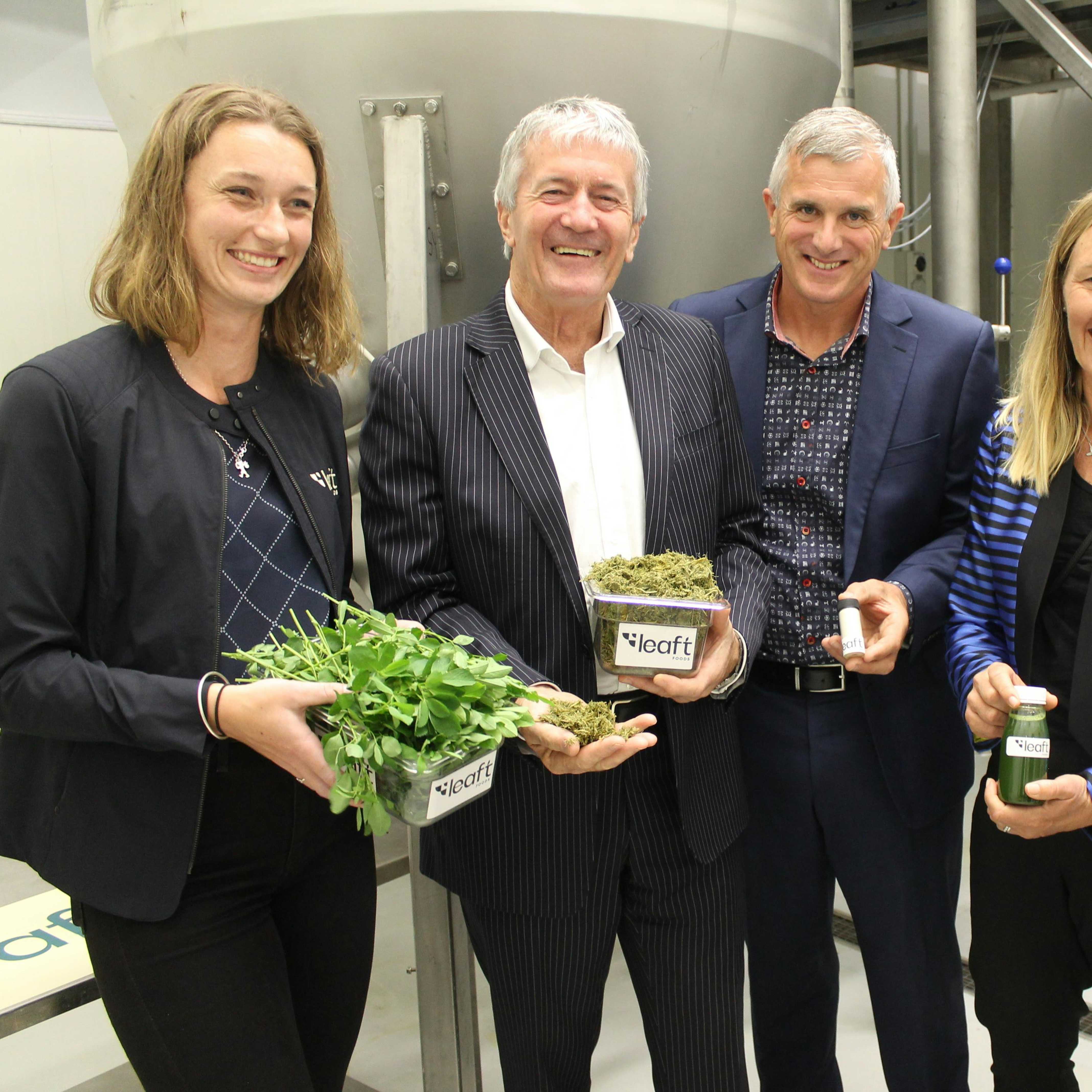Table of Contents
Alfalfa
Alfalfa is a highly versatile, tolerant crop. Not only is it easy to grow, it’s also incredibly high in protein, making it a popular livestock crop all over the world.
However, recent scientific breakthroughs have made it possible to unleash alfalfa protein for humans like never before. Alfalfa, which is also known as lucerne, is rich in rubisco protein, which is the world’s most abundant source of plant protein.
But until now, human digestive systems haven’t been able to tap into everything rubisco has to offer. Leaft Foods’ rubisco protein extraction technology makes it more possible than ever to grow sustainable, environmentally friendly plant protein through the alfalfa plant.
The Power of Plant-Based Protein
The popularity of plant-based protein has surged in recent years. Where meat-free diets used to be complicated and inconvenient, they’re now as mainstream as ever.
Whether it’s for environmental, sustainability, animal welfare or other reasons, more and more people are adopting plant-based diets. In one study, 61% of respondents said they preferred plant protein to animal-based protein.
The myth that people need animal protein to sustain themselves has been well and truly busted. Plant-based proteins have been shown time and time again to have sufficient sustenance for people - and what’s more, they tend to be a more sustainable, environmentally friendly protein source compared to animal proteins.
People are also more health conscious than before. We have greater awareness of the effect of whatever we put in our bodies, and more people are putting more value on making good health choices. Again, that’s a big tick for plant proteins, which have significant nutritional value.
All this is going on amid a rising global population, increasing food insecurity and a greater need for sustainable ways of feeding the world. The food industry is confronted by a huge, multi-faceted raft of issues, and plant-based proteins have the potential to be a big part of the answer.
This is where Leaft Foods comes in. Our technology has the ability to unlock the considerable nutritional goodness in the world’s most abundant proteins - rubisco. Currently, rubisco’s abundance is perhaps only matched by its untapped potential, in that much of its goodness hasn’t been able to be utilized by humans.
With demand for plant proteins only increasing, rubisco - and alfalfa - are set to play a huge role in feeding the world in the coming years.
Exploring Alfalfa as a Protein Source
Rubisco is present in any green leaf - it’s the protein that’s responsible for photosynthesis. In theory, we could harvest rubisco from any leafy plant. The reason alfalfa is such a good source of rubisco protein is in how easy it is to grow, requiring much less input from farmers and growers.
The nutritional benefits of alfalfa protein are vast. It offers complete nutrition, with an amino acid profile similar to beef. This is a big part of the reason why it’s been so commonly used for livestock feed - it’s incredibly nutrient dense and a highly efficient source of energy.
On top of being protein-rich, alfalfa protein is able to be grown in harmony with the environment. As we’ve mentioned, the alfalfa plant requires much less water than other crops, and it’s also easy to manage with minimal input.
Alfalfa is what’s known as a nitrogen fixing crop, which means it converts atmospheric nitrogen into organic nitrogen. This way, it takes nitrogen out of the soil, uses what it needs, stores the rest, and when the plant is harvested or it dies, this nitrogen is then available for the next crop that’s planted.
Alfalfa is an incredibly hungry nitrogen fixing crop, which has the ultimate effect of improving soil health and reducing the environmental impact of farming or growing. It’s becoming an increasingly popular crop among farmers looking to diversify their land use, feed their stock efficiently and lowering their overall emissions.
The Innovation Behind Leaft Foods' Technology
With all these benefits well known, you’d think we would have got onto growing and consuming alfalfa’s rubisco protein by now. The only problem has been our digestive systems.
Herbivores like cows have been thriving off rubisco protein because they’re evolved to extract it from the leaves and grass they eat. But when humans eat rubisco in things like kale, alfalfa sprouts, lettuce and other leafy greens, we don’t actually digest enough rubisco protein to sustain ourselves for a long time.
This is a similar issue to other plant-based proteins, such as whey and soy. These typically come in seeds that are designed to be able to be digested and then pooped out relatively intact. When this happens, the goodness they offer isn’t fully absorbed into the body. This is why many people feel bloated when they have pea protein - because it sits in their gut being slowly absorbed for a long time.
Where Leaft Foods’ technology is so revolutionary is that it separates rubisco protein from the fibrous, green material from plants like alfalfa, leaving the edible protein intact. Ironically, rubisco protein is highly digestible in this form, and this innovative protein extraction method maintains all the goodness.
By doing this, our food safe technology opens up a new way of sustainable food production using a readily available protein source through alfalfa.
Sustainable Agriculture and Alfalfa
Leaft Foods was founded on a commitment to finding a better way to produce food. Sustainable agriculture and alfalfa go hand-in-hand, as the crop itself requires few inputs.
In some cases, farmers and growers are able to significantly transform their environmental footprints by growing alfalfa:
- Our modeling suggests that producing Rubisco protein directly from leafy crops has a 93% lower carbon footprint than conventional dairy protein.
- Adopting the Leaft system on as little as 20% of agricultural land can reduce the emissions footprint, benefit soil health, improve crop productivity and create feed self-sufficiency for livestock farmers.
By diversifying land and growing alfalfa, farmers can efficiently sustain their agricultural production with home-grown crops, and harvest any remaining alfalfa for rubisco protein. This also promotes soil diversity and reduces the reliance on monocropping, as alfalfa replenishes the land within a crop rotation.
Farmers are coming under huge pressure to decarbonise their operations. Their social license is being increasingly affected by unsustainable practices, while financial penalties and incentives make it necessary to be more environmentally friendly from a business perspective.
By growing alfalfa protein, farmers and growers of all shapes and sizes have a golden opportunity to better achieve their food production and lifestyle goals.
The Versatility of Alfalfa Protein
Being a highly nutritious, environmentally friendly plant protein already sets alfalfa protein apart from others. But it has another factor that really takes it to the next level.
The versatility of alfalfa protein for consumers makes it simple and easy to consume. It’s neutral tasting and water soluble, meaning the food applications of alfalfa protein are vast.
You can mix it with plant-based meat alternatives or baking - it’s a great way to supercharge home-made protein bars. You can have it in smoothies, with baking, salads or virtually anything.
As we’ve mentioned, the digestibility of alfalfa protein makes it much easier to eat compared to other plant-based protein products. It’s not gritty or thick, which also adds to its versatility because you can add it to other foods and hardly notice it’s there.
Many people like to mix protein with other foods to add nutrition to a meal without noticing it’s there. Alfalfa protein is perfect for this. It also has no known allergens, so it’s compatible with any diet.
All of these qualities underline the huge market potential for alfalfa protein. As consumer demand for innovative plant-based protein products continues to rise, the qualities of alfalfa protein and the way it ticks all the boxes are set to empower its popularity.
Conclusion
It’s incredibly rare for one food type to offer solutions to so many nutritional issues. Perhaps this is what makes alfalfa protein so unique, and what gives it almost limitless potential.
As a sustainable, nutritious, abundant and highly edible protein, there’s nothing else that compares to everything alfalfa protein has to offer. These qualities are all in high demand around the world right now, and that demand will only increase in the years to come.
Leaft Foods’ commitment to reducing the environmental impact of food is steadfast, and there are many others with a similar approach. However, the difference is Leaft Foods’ innovation in making such an effective protein available.
The breakthrough in unlocking the protein potential of alfalfa is hugely significant, and that’s expected to be highlighted in the coming years as more and more people catch on.


